Health Risks and Allergies Related to Chia Seeds
Chia Seeds: Superfood or Allergy Trigger?

When it comes to chia seeds, there has been a lot of talk about their superfood qualities, but do they truly deliver on the hype? Is there a possibility that they could trigger allergic reactions in certain people?
In this article, we’ll explore the potential health benefits of chia seeds, as well as the common symptoms and factors contributing to chia seed allergies.
We’ll also provide tips on managing chia seed allergies in your diet and offer alternatives for those who suffer from allergies.
Let’s dig in and uncover the truth about chia seeds.

Key Takeaways
- Chia seeds are rich in omega-3 fatty acids, fiber, and protein, and provide essential minerals and antioxidants.
- Chia seed allergies can manifest as hives, swelling, abdominal pain, and in severe cases, anaphylaxis.
- Managing chia seed allergies involves avoiding chia seeds, reading food labels carefully, and carrying an epinephrine auto-injector.
- Flax seeds, hemp seeds, pumpkin seeds, sunflower seeds, and sesame seeds are alternative options for allergy sufferers with similar nutritional benefits.
Potential Health Benefits of Chia Seeds
While there have been claims of potential health benefits associated with chia seeds, it’s important to examine the scientific evidence.
Chia seeds have gained popularity in recent years due to their impressive nutritional profile. These tiny seeds are packed with essential nutrients, including fiber, protein, omega-3 fatty acids, and antioxidants. They’re also a good source of minerals like calcium, magnesium, and phosphorus.
Research suggests that incorporating chia seeds into your diet may help improve digestion, support weight loss, and lower the risk of chronic diseases such as heart disease and diabetes. However, it’s essential to note that more studies are needed to fully understand the extent of these potential benefits.
Now, let’s explore the common symptoms of chia seed allergies.

Common Symptoms of Chia Seed Allergies
We will now discuss the common symptoms of chia seed allergies. Allergies to chia seeds are relatively rare, but they can cause uncomfortable symptoms in some individuals.
The most common symptom is an allergic reaction, which can manifest as hives, itching, or swelling of the lips, tongue, or throat. Other symptoms may include abdominal pain, nausea, vomiting, or diarrhea.
In severe cases, chia seed allergies can lead to anaphylaxis, a life-threatening allergic reaction that requires immediate medical attention. If you experience any of these symptoms after consuming chia seeds, it’s important to seek medical advice.
Management of chia seed allergies involves avoiding chia seeds and other sources of chia, reading food labels carefully, and carrying an epinephrine auto-injector in case of emergency. Identifying and avoiding allergy triggers is essential for the well-being of individuals with chia seed allergies.

Factors Contributing to Chia Seed Allergies
Moving forward into the subtopic of factors contributing to chia seed allergies, it’s important to understand that certain individuals may be more prone to developing allergic reactions due to a combination of genetic predisposition and exposure frequency.
While chia seeds are generally considered safe for consumption, some people may experience allergic reactions to them. The causes of chia seed allergies can vary from person to person, but they’re typically triggered by proteins present in the seeds. These proteins can stimulate an immune response in sensitive individuals, leading to symptoms such as itching, hives, and even anaphylaxis in severe cases.
Additionally, the frequency of chia seed consumption can play a role in the development of allergies. Regular exposure to chia seeds can increase the likelihood of an allergic reaction occurring.
Understanding these factors can help individuals identify potential risks and take necessary precautions to manage chia seed allergies in their diet.

Managing Chia Seed Allergies in Your Diet
To effectively manage chia seed allergies in our diet, it’s important to understand and implement strategies that minimize exposure to these allergens.
If you have a chia seed allergy, the first step is to avoid consuming chia seeds and any products that contain them. Carefully read food labels and ingredient lists to ensure that chia seeds aren’t present.
It’s also crucial to be aware of cross-contamination, as chia seeds can be found in unexpected places such as gluten-free products, granola bars, and smoothies.
If you accidentally consume chia seeds and experience symptoms like hives, itching, or difficulty breathing, seek medical attention immediately. It’s advisable to carry an epinephrine auto-injector in case of severe allergic reactions.

Consulting with a healthcare professional or allergist can provide personalized guidance and recommendations for managing chia seed allergies effectively.
Alternatives to Chia Seeds for Allergy Sufferers
One popular alternative for allergy sufferers is incorporating flax seeds into our diet. Flax seeds are a great source of omega-3 fatty acids, fiber, and protein. They’re also gluten-free and can be used as a substitute for chia seeds in many recipes. Flax seeds can be ground and added to smoothies, baked goods, or used as an egg substitute in vegan recipes.
Another option for allergy sufferers is hemp seeds. Hemp seeds are rich in protein, healthy fats, and vitamins. They’re also gluten-free and can be used in a variety of dishes, such as salads, yogurt, or as a topping for oatmeal.
Other gluten-free substitutes for chia seeds include pumpkin seeds, sunflower seeds, and sesame seeds. These alternatives provide similar nutritional benefits and can be easily incorporated into a balanced diet.
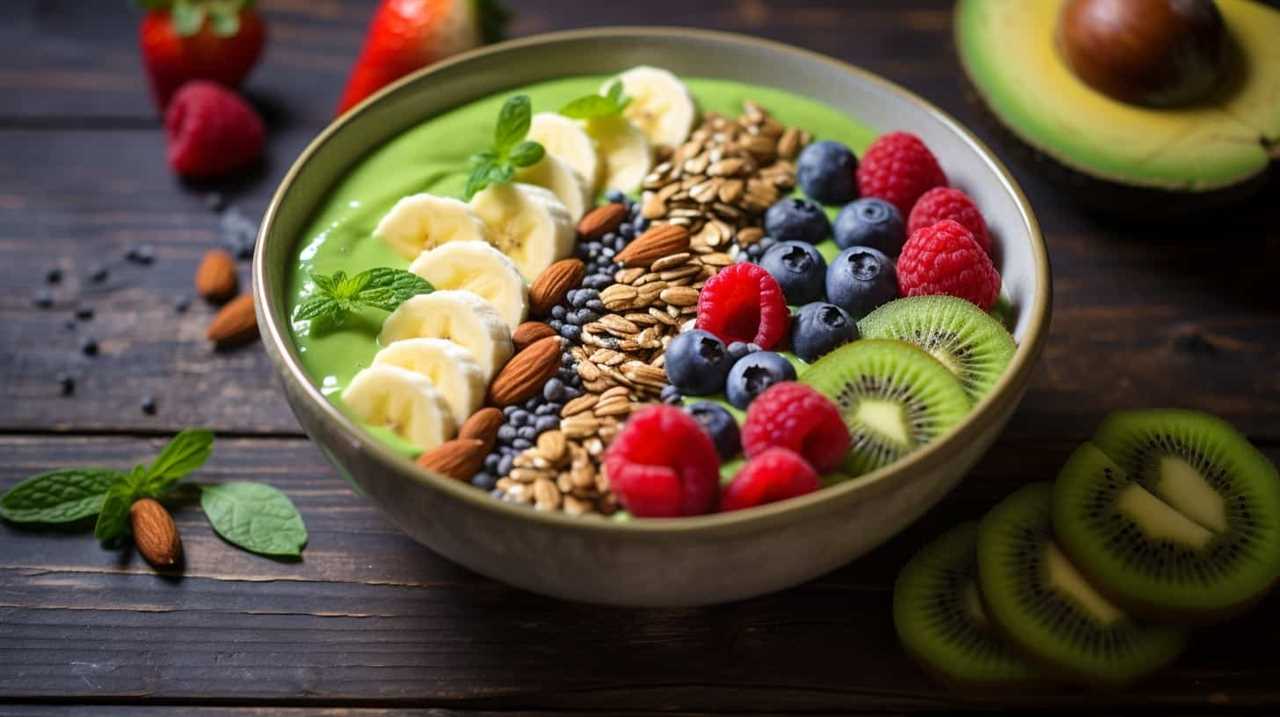
Frequently Asked Questions
Can Chia Seeds Help With Weight Loss?
Chia seeds can help with weight loss due to their high dietary fiber content. They promote a feeling of fullness and can regulate blood sugar levels. Incorporating chia seeds into a balanced diet may support weight management.
Are Chia Seeds Safe for Consumption During Pregnancy?
Chia seeds during pregnancy? We’ve got you covered. Chia seeds may help with morning sickness and have potential benefits for fetal development. But as always, consult your healthcare provider for personalized advice.
How Do Chia Seeds Compare to Other Superfoods in Terms of Nutritional Value?
Chia seeds offer numerous benefits for digestion and are a great source of omega-3 fatty acids when compared to other superfoods. Incorporating them into our diet can support overall health and well-being.
Can Chia Seeds Help Lower Cholesterol Levels?
Chia seeds can help lower cholesterol levels, benefiting heart and cardiovascular health. They are rich in omega-3 fatty acids and fiber, which have been shown to reduce LDL cholesterol. Incorporating chia seeds into our diet may promote a healthier heart.

Are Chia Seeds Suitable for Individuals With Diabetes?
Chia seeds can be suitable for individuals with diabetes. They have been shown to help with blood sugar control and improve insulin sensitivity. However, it’s important to consult with a healthcare professional for personalized guidance.
Conclusion
In conclusion, while chia seeds have gained a reputation as a superfood, they may not be so super for everyone. Allergies to chia seeds can cause unpleasant symptoms, but fear not, there are alternatives out there.
So, if you find yourself sneezing and itching after indulging in these trendy little seeds, fear not, there are plenty of other nutritious options to satisfy your cravings. Remember, it’s all about finding what works best for your body.
Happy snacking!

Hi, I’m Sarah. I write for Turtle Tree Seeds, a news blog that loves food – all kinds of food. But especially bacon, chocolate, and veggies. We’re on a mission to show the world that you can enjoy all of those things, even kale and brussels sprouts. Because we believe that when it comes to food, there’s no such thing as guilty pleasures. Just pleasures.
I’m also a huge fan of puns (obviously).
Health Risks and Allergies Related to Chia Seeds
Why Might Tiny Seeds Pose Big Health Dangers?


Have you ever thought about how a small seed can pose major health risks? Let us elaborate!
From potential choking hazards to digestive issues and allergic reactions, tiny seeds can pack a punch. Not only that, but they can also interact with medications and even be contaminated with molds.
In this article, we will explore the various ways in which these seemingly harmless seeds can pose a risk to our health. So, buckle up and get ready for some eye-opening information!
Key Takeaways
- Seeds can pose choking hazards and lead to digestive issues and inflammation in certain individuals.
- Allergies and sensitivities to seeds, as well as hidden allergens in processed foods, can be a concern.
- Some seeds can interfere with the absorption of medications, potentially affecting their effectiveness.
- Contamination and mold on seeds can cause allergic reactions, respiratory issues, and toxic effects. It is important to properly store and handle seeds to prevent mold contamination.
Potential Choking Hazard
One potential health danger associated with tiny seeds is that they can pose a choking hazard. Due to their small size, seeds can easily become lodged in the throat, blocking the airway and causing a life-threatening situation. It’s crucial to be aware of this risk, especially when serving meals to children or individuals who have difficulty chewing or swallowing.

Prevention measures can include educating oneself and others about the potential choking hazards of seeds, ensuring that seeds are ground or crushed before consumption, and closely supervising children while they eat. In the event of a choking emergency, immediate action is necessary. Knowing proper emergency response techniques such as the Heimlich maneuver can be lifesaving.
Transitioning into the subsequent section about digestive issues and blockages, it’s important to understand that choking is just one of the potential health risks associated with tiny seeds.
Digestive Issues and Blockages
Tiny seeds can cause digestive issues and blockages, leading to potential health risks. It’s important to be aware of these risks and take necessary precautions to ensure food safety and avoid complications.
Here are some key points to consider:

-
Choking Hazard: Some tiny seeds, such as those found in berries or chia seeds, can easily get stuck in the throat, causing choking. It’s crucial to chew these seeds thoroughly or avoid them altogether if you have difficulty swallowing.
-
Intestinal Blockages: Consuming large quantities of tiny seeds, particularly those with a high fiber content, can lead to intestinal blockages. This is especially concerning for individuals with certain dietary restrictions, such as those following a low-fiber diet or recovering from digestive surgeries.
-
Diverticulitis Risk: People with diverticulitis, a condition characterized by inflamed pouches in the colon, should avoid consuming tiny seeds. These seeds can get trapped in the pouches and cause inflammation, leading to pain and discomfort.
-
Risk of Nutrient Absorption: Some tiny seeds, like flaxseeds, contain anti-nutrients that can interfere with the absorption of certain nutrients. Individuals with nutrient deficiencies or specific dietary needs should consult with a healthcare professional before consuming large amounts of these seeds.
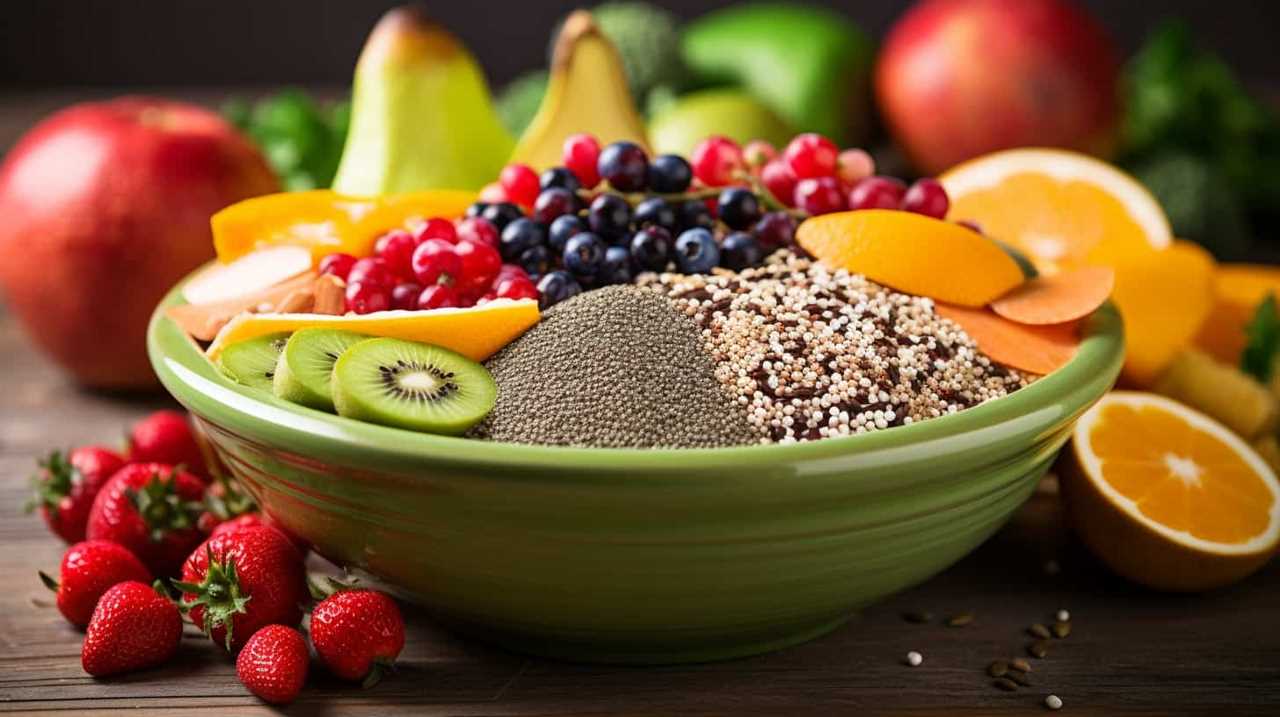
Being mindful of these potential digestive issues and blockages can help ensure that your dietary choices align with your overall health goals and avoid any unnecessary complications.
It’s always advisable to consult with a healthcare professional or registered dietitian for personalized guidance based on your specific needs and dietary restrictions.
Allergic Reactions and Sensitivities
We need to be aware of the potential allergic reactions and sensitivities that can arise from consuming tiny seeds.
While seeds are generally a healthy addition to our diet, it’s important to note that some individuals may have an allergic reaction or sensitivity to certain types of seeds.

Cross contamination can occur during the manufacturing process, where seeds may come into contact with allergens such as peanuts or tree nuts. This can pose a serious risk to those with allergies, as even trace amounts of allergens can trigger a reaction.
Additionally, hidden ingredients in processed foods can also be a concern. Some food products may contain seeds as an ingredient, which can be unexpected for those with allergies or sensitivities.
It’s crucial to read labels carefully and be aware of hidden ingredients to avoid any potential health risks.
Interactions With Medications
Moving on to the topic of interactions with medications, it’s important to be aware of how consuming tiny seeds can potentially affect the effectiveness of certain medications. These potential drug interactions can have an impact on medication efficacy and shouldn’t be overlooked. Here are four key points to consider:
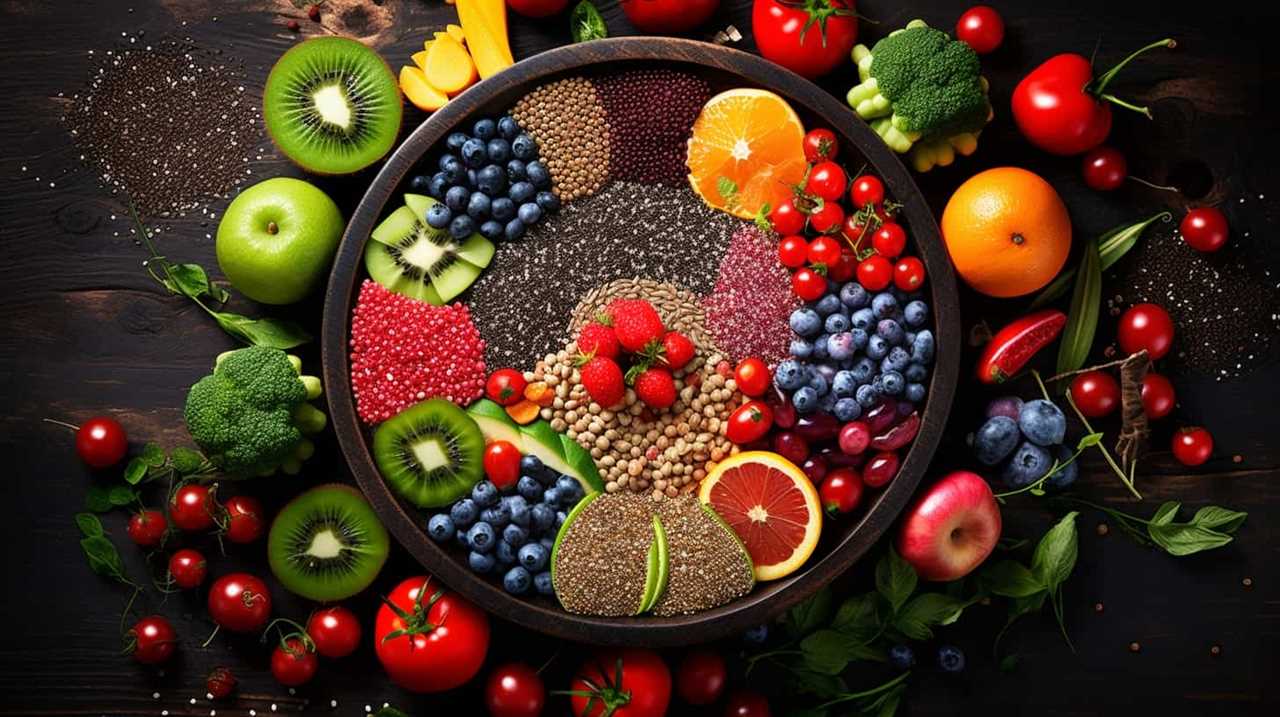
-
Some tiny seeds, such as flaxseeds or chia seeds, contain high amounts of fiber. While fiber is generally beneficial for digestive health, it can also interfere with the absorption of certain medications, leading to reduced effectiveness.
-
Certain tiny seeds, like grapefruit seeds, contain compounds that can inhibit enzymes responsible for breaking down medications in the body. This can result in increased levels of the medication in the bloodstream, potentially leading to side effects or toxicity.
-
Seeds rich in omega-3 fatty acids, like hemp seeds, may have blood-thinning properties. When combined with medications that also have blood-thinning effects, such as anticoagulants, it can increase the risk of bleeding.
-
Some tiny seeds, such as sesame seeds, contain compounds that may interact with medications used to lower blood pressure. This interaction can potentially reduce the effectiveness of these medications.

It is crucial to consult with a healthcare professional or pharmacist before incorporating large amounts of tiny seeds into your diet, especially if you’re taking medications. They can provide guidance on potential drug interactions and ensure the optimal efficacy of your medications.
Contamination and Molds
Continuing the discussion on interactions with medications, it’s important to address the potential dangers of contamination and molds when consuming tiny seeds.
Ensuring food safety is crucial to protect against health risks associated with consuming contaminated seeds. Contamination can occur during the production, harvesting, or processing stages, leading to the presence of harmful bacteria, viruses, or parasites on the seeds’ surface. These contaminants can cause foodborne illnesses and pose significant health risks, especially for individuals with weakened immune systems.
Additionally, molds can grow on seeds if they’re stored in warm and humid conditions. Some molds produce toxins called mycotoxins, which can be harmful when ingested.

Therefore, it’s essential to follow proper storage and handling practices to minimize the risk of contamination and molds and ensure the safety of consuming tiny seeds.
Frequently Asked Questions
How Can Tiny Seeds Pose a Potential Choking Hazard?
Tiny seeds can pose a potential choking hazard due to their small size and shape. To prevent this, potential solutions include cutting up food containing seeds and supervising children while eating to ensure safe consumption.
What Are the Common Digestive Issues and Blockages Associated With the Consumption of Tiny Seeds?
Digestive issues and blockages can arise from consuming tiny seeds. These can include food allergies and digestive disorders. The potential dangers of these tiny seeds might surprise you, so let’s dive into the details.
What Are Some Examples of Allergic Reactions and Sensitivities That Can Be Triggered by Consuming Tiny Seeds?
Examples of cross contamination risks include allergic reactions and sensitivities triggered by consuming tiny seeds. However, it is important to note the potential health benefits of consuming these seeds, such as their rich nutritional content.

Are There Any Known Interactions Between Medications and the Consumption of Tiny Seeds?
There could be potential dangers when it comes to interactions between medications and consuming tiny seeds. It is important to be aware of this possibility and consult a healthcare professional for guidance.
What Are the Risks of Contamination and Molds Associated With Tiny Seeds?
Contamination and molds associated with tiny seeds can pose risks of pesticide exposure and impact on the gut microbiome. It’s important to be aware of these potential health dangers when consuming tiny seeds.
Conclusion
In conclusion, it’s vital to be aware of the potential health dangers that tiny seeds can pose. From being a choking hazard to causing digestive issues and blockages, these seeds should be approached with caution.
Allergic reactions, interactions with medications, and the risk of contamination and molds further emphasize the need for proper handling. Therefore, it’s imperative to educate oneself and take necessary precautions to ensure one’s well-being.

Remember, with great seeds comes great responsibility.
Hi, I’m Sarah. I write for Turtle Tree Seeds, a news blog that loves food – all kinds of food. But especially bacon, chocolate, and veggies. We’re on a mission to show the world that you can enjoy all of those things, even kale and brussels sprouts. Because we believe that when it comes to food, there’s no such thing as guilty pleasures. Just pleasures.
I’m also a huge fan of puns (obviously).
Health Risks and Allergies Related to Chia Seeds
Identifying Allergic Reactions to Chia Seeds


Curious about potential allergic reactions to chia seeds? Look no further for information and help!
In this article, we’ll delve into the various symptoms and risks associated with chia seed allergies. From skin reactions to respiratory and gastrointestinal issues, we’ll cover it all.
Pay close attention to the cardiovascular symptoms and the potential risk of anaphylaxis.
Stay informed and empowered as we guide you in identifying and understanding allergic reactions to chia seeds.

Key Takeaways
- Itchy rashes and hives are common skin reactions to chia seed allergies.
- Difficulty breathing is a common respiratory symptom of chia seed allergies.
- Diarrhea can be triggered by chia seed allergies, leading to frequent bowel movements and dehydration.
- Chia seed allergies can manifest as heart palpitations, indicating a rapid or irregular heartbeat.
Skin Reactions
We will now discuss the skin reactions that can occur as a result of allergic responses to chia seeds.
Allergic reactions to chia seeds can manifest in various ways, with itchy rashes and hives being common skin reactions.
When individuals with a chia seed allergy come into contact with chia seeds or products containing chia seeds, their immune system may perceive them as harmful substances and trigger an allergic response.
This immune response can lead to the release of histamines, which causes blood vessels to dilate and results in itchy rashes and hives on the skin.

Itchy rashes are characterized by red, inflamed patches that may be accompanied by intense itching. Hives, on the other hand, appear as raised, itchy bumps on the skin.
If you experience these skin reactions after consuming or coming into contact with chia seeds, it’s important to seek medical attention for proper diagnosis and management.
Respiratory Symptoms
One common respiratory symptom of allergic reactions to chia seeds is difficulty breathing. When individuals with chia seed allergies are exposed to chia seeds, their airways can become inflamed, leading to a sensation of tightness in the chest and a feeling as if they can’t get enough air. This can result in wheezing, a high-pitched whistling sound that occurs during breathing due to narrowed air passages.
In addition, nasal congestion may also occur, making it difficult to breathe through the nose. These respiratory symptoms can be distressing and may require immediate medical attention. Understanding and recognizing these symptoms is crucial in order to promptly address allergic reactions and prevent any potential complications.

Transitioning to the subsequent section, gastrointestinal issues can also arise as a result of chia seed allergies.
Gastrointestinal Issues
Experiencing gastrointestinal issues is a common manifestation of allergic reactions to chia seeds. When it comes to the digestive system, allergic reactions can cause a range of uncomfortable symptoms. Here are four important points to consider:
-
Diarrhea: Allergic reactions to chia seeds can trigger loose, watery stools, leading to frequent bowel movements and dehydration.
-
Bloating: Many individuals may experience bloating as a result of chia seed allergies. This uncomfortable sensation can be accompanied by abdominal discomfort and distention.

-
Abdominal pain: Allergic reactions may cause abdominal pain, which can range from mild discomfort to severe cramping.
-
Nausea and vomiting: Some individuals may experience these symptoms as a result of chia seed allergies. It’s important to monitor for signs of dehydration and seek medical attention if these symptoms persist.
If you or someone you know is experiencing these gastrointestinal issues after consuming chia seeds, it’s recommended to consult a healthcare professional for proper diagnosis and guidance.
Cardiovascular Symptoms
Another important aspect of allergic reactions to chia seeds is the presence of cardiovascular symptoms. These symptoms can range from mild to severe and may include heart palpitations and high blood pressure.

Heart palpitations, also known as rapid or irregular heartbeat, can be a sign of an allergic reaction to chia seeds. They may occur due to the release of histamine, a chemical that triggers inflammation and allergic responses.
Additionally, high blood pressure can be a result of an allergic reaction, as the body’s immune system reacts to the allergens present in chia seeds.
It’s crucial to monitor these cardiovascular symptoms closely and seek medical attention if they persist or worsen. Understanding and recognizing these symptoms can help individuals with chia seed allergies manage their condition effectively and prevent any potential complications.
Anaphylaxis Risk
As we continue discussing the allergic reactions to chia seeds, it’s important to address the anaphylaxis risk associated with consuming these seeds. Anaphylactic shock is a severe allergic reaction that can be life-threatening and requires immediate medical attention.
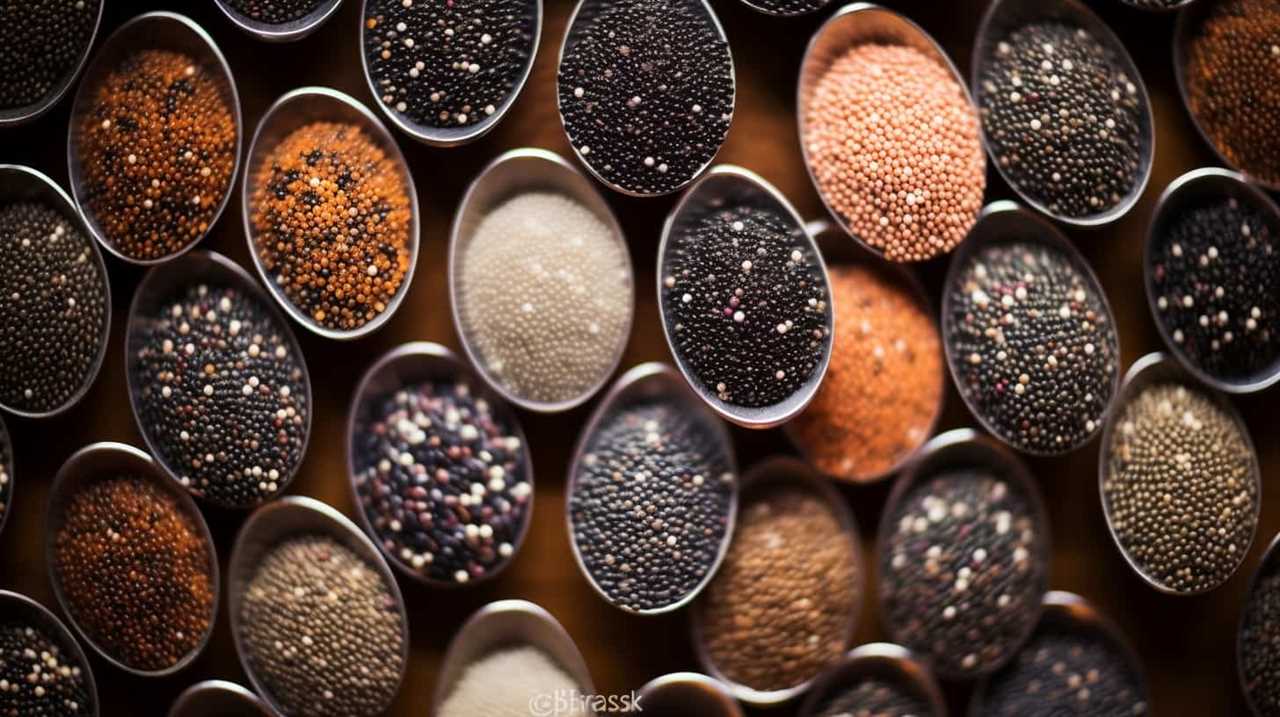
Here are four important points to consider regarding the anaphylaxis risk of chia seeds:
- Chia seeds can trigger anaphylactic reactions in individuals who are allergic to them.
- Symptoms of anaphylaxis may include difficulty breathing, swelling of the face or throat, hives, and a rapid heartbeat.
- If someone experiences anaphylaxis after consuming chia seeds, emergency treatment should be sought immediately.
- The emergency treatment for anaphylaxis often involves the administration of epinephrine, a medication that helps to reverse the allergic reaction and stabilize the person’s condition.
It is crucial to be aware of the anaphylaxis risk associated with chia seeds and to seek prompt medical attention if any symptoms of an allergic reaction occur.
Frequently Asked Questions
Can Chia Seeds Cause Allergic Reactions in People Who Have No Known Allergies?
Chia seeds can potentially trigger allergic reactions even in individuals without known allergies. Possible underlying factors and the role of genetics are important in determining susceptibility to chia seed allergies.
Are There Any Specific Age Groups More Prone to Experiencing Allergic Reactions to Chia Seeds?
Specific risk factors for allergic reactions to chia seeds include genetic predisposition and previous allergies. All age groups can be prone to experiencing these reactions, which can significantly impact the quality of life.

How Long Does It Typically Take for an Allergic Reaction to Chia Seeds to Occur After Consumption?
Onset time for allergic reactions to chia seeds varies, but symptoms typically appear within a few hours of consumption. These can include hives, itching, swelling, difficulty breathing, and digestive issues.
Can Allergic Reactions to Chia Seeds Worsen Over Time With Repeated Exposure?
Yes, allergic reactions to chia seeds can worsen over time with repeated exposure. This occurs as the immune system perceives chia seeds as a threat and mounts a stronger response. Underlying allergies may also contribute to the worsening of symptoms.
Are There Any Cross-Reactions Between Chia Seeds and Other Common Allergens, Such as Nuts or Seeds?
Yes, there can be cross-reactions between chia seeds and tree nuts in individuals with no known allergies. It’s important to be aware of these potential allergens to ensure safe consumption.
Conclusion
In conclusion, it’s important to be aware of the potential allergic reactions that can occur from consuming chia seeds. Studies have shown that approximately 1-3% of the population may experience an allergic response to chia seeds, with skin reactions being the most common symptom.

While respiratory, gastrointestinal, and cardiovascular symptoms may also occur, it’s crucial to note that anaphylaxis, a severe and potentially life-threatening reaction, can occur in rare cases. Therefore, individuals with known allergies should exercise caution when consuming chia seeds.
Hi, I’m Sarah. I write for Turtle Tree Seeds, a news blog that loves food – all kinds of food. But especially bacon, chocolate, and veggies. We’re on a mission to show the world that you can enjoy all of those things, even kale and brussels sprouts. Because we believe that when it comes to food, there’s no such thing as guilty pleasures. Just pleasures.
I’m also a huge fan of puns (obviously).
Health Risks and Allergies Related to Chia Seeds
3 Best Insights on Allergy Risks From Super Seeds
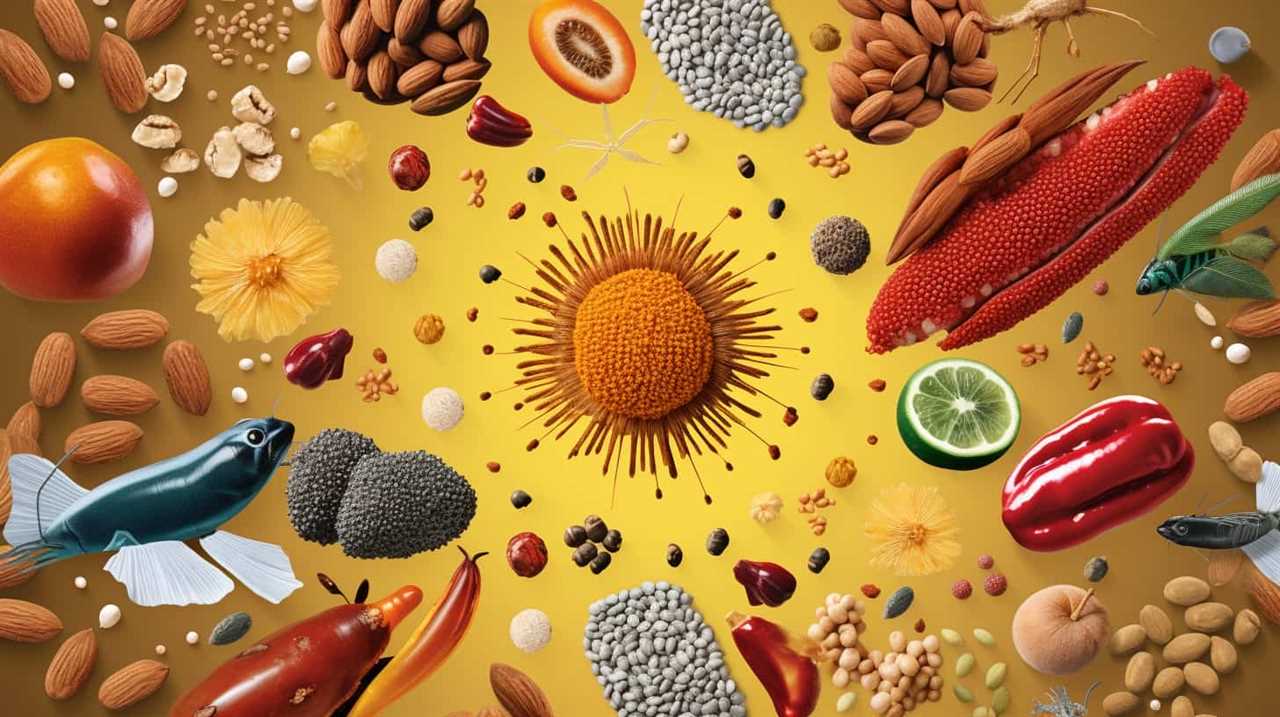
We’ve explored the world of super seeds to uncover the three main insights about allergy risks.
Brace yourselves, because we’re about to share some eye-opening information about these tiny powerhouses.
From chia seeds to flax seeds, we’ll explore the common allergic reactions, the symptoms to watch out for, and the best ways to prevent and manage allergies.
Get ready to protect your health and enjoy the benefits of these super seeds.
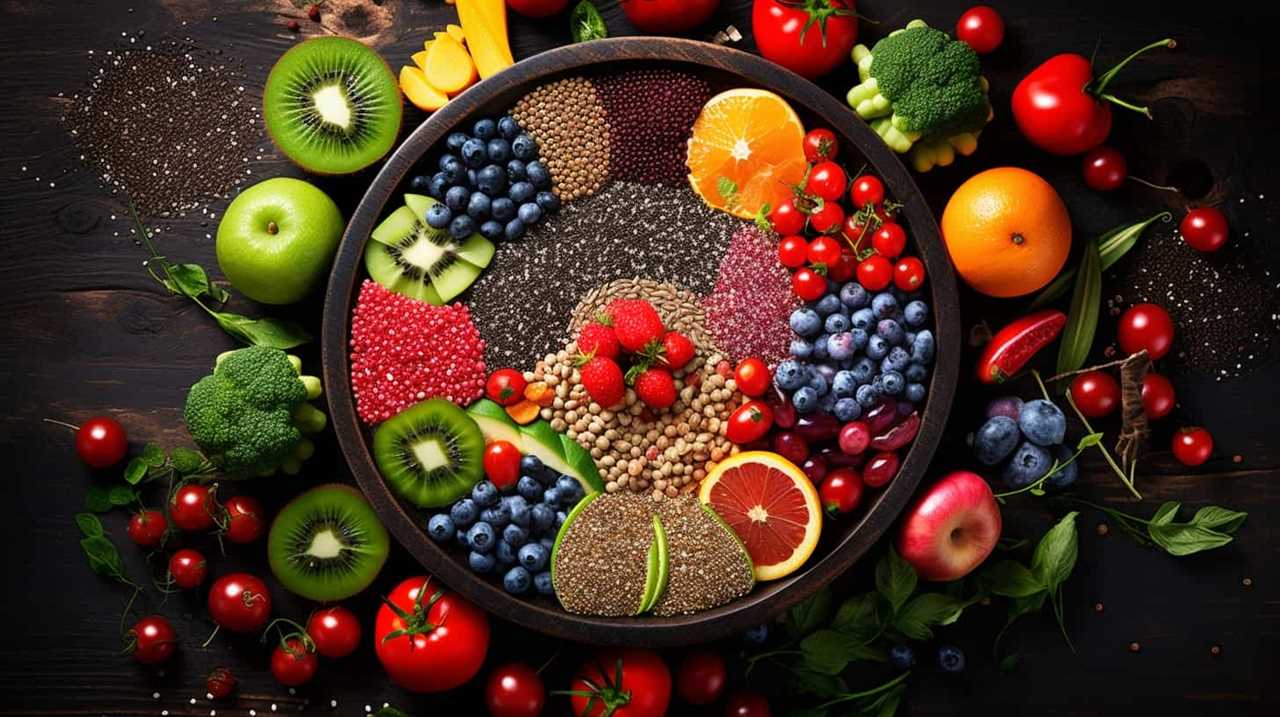
Let’s dive in!
Key Takeaways
- Allergic reactions to chia seeds have increased among individuals with multiple allergen sensitivities.
- Cross-reactivity allergies can occur, where the immune system recognizes similar proteins in different substances as harmful and triggers an allergic response.
- Chia seeds, being a member of the mint family, can cross-react with other plants in the same family such as basil and oregano.
- Common symptoms of chia seed allergies include itching, hives, digestive discomfort, swelling of the lips, tongue, or throat, difficulty breathing or wheezing, nasal congestion or a runny nose, and abdominal pain or cramping.
Common Allergic Reactions to Chia Seeds
We have observed an increase in allergic reactions to chia seeds among individuals who’ve a sensitivity to multiple allergens. This phenomenon can be attributed to cross-reactivity allergies, where the immune system recognizes similar proteins in different substances as harmful and triggers an allergic response.
Chia seeds, being a member of the mint family, can cross-react with other plants in the same family, such as basil and oregano. This means that individuals with allergies to these plants may also experience allergic reactions to chia seeds.
It’s important for those with known cross-reactivity allergies to be cautious when consuming chia seeds or products containing them. Fortunately, there are alternative super seeds available, such as flaxseeds and hemp seeds, that can provide similar health benefits without the risk of triggering allergic reactions.
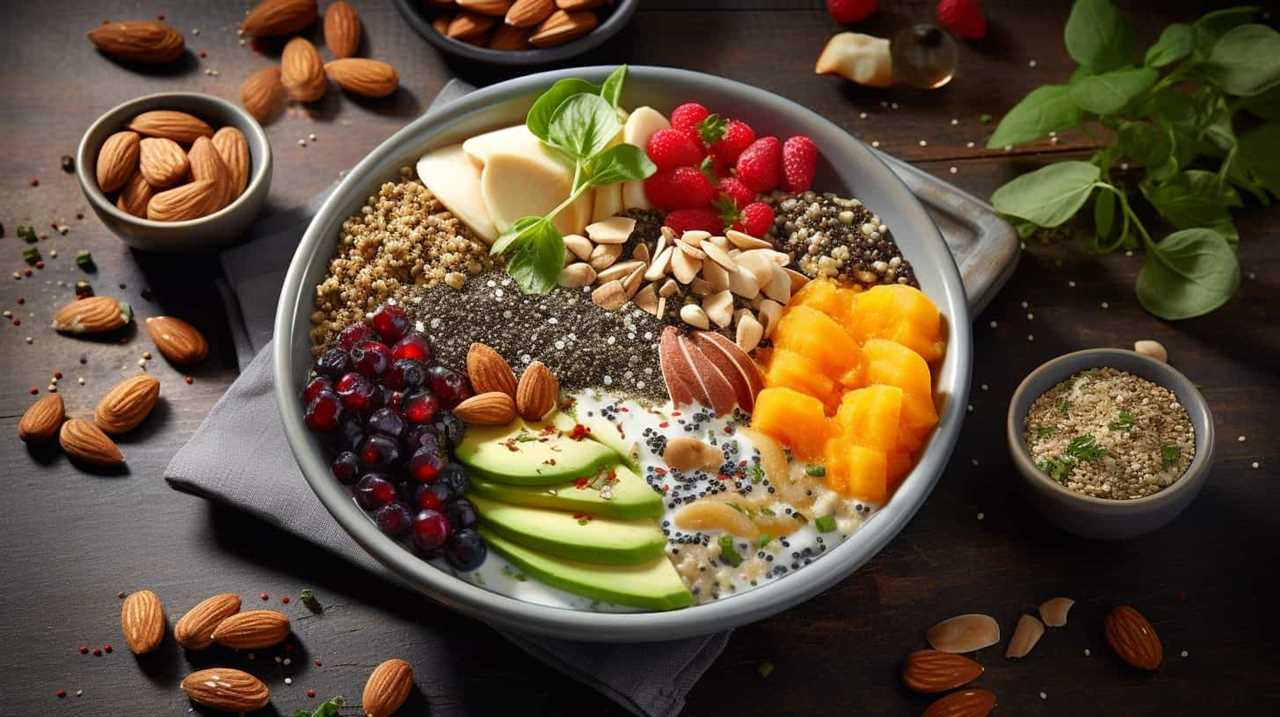
Symptoms of Chia Seed Allergies
Some common symptoms of chia seed allergies include itching, hives, and digestive discomfort. When individuals with chia seed allergies consume or come into contact with chia seeds, their immune system may react negatively, resulting in these symptoms. However, it’s important to note that chia seed allergies are relatively rare.
Here are some additional symptoms that may occur in individuals with chia seed allergies:
- Swelling of the lips, tongue, or throat
- Difficulty breathing or wheezing
- Nasal congestion or runny nose
- Abdominal pain or cramping
It is also worth mentioning that cross-reactivity can occur in individuals with chia seed allergies. This means that they may also experience allergic reactions when consuming other seeds or foods that share similar proteins with chia seeds. Additionally, some individuals may have chia seed intolerance, which can cause digestive symptoms without involving the immune system.
If you suspect a chia seed allergy or intolerance, it’s best to consult with a healthcare professional for proper diagnosis and guidance.
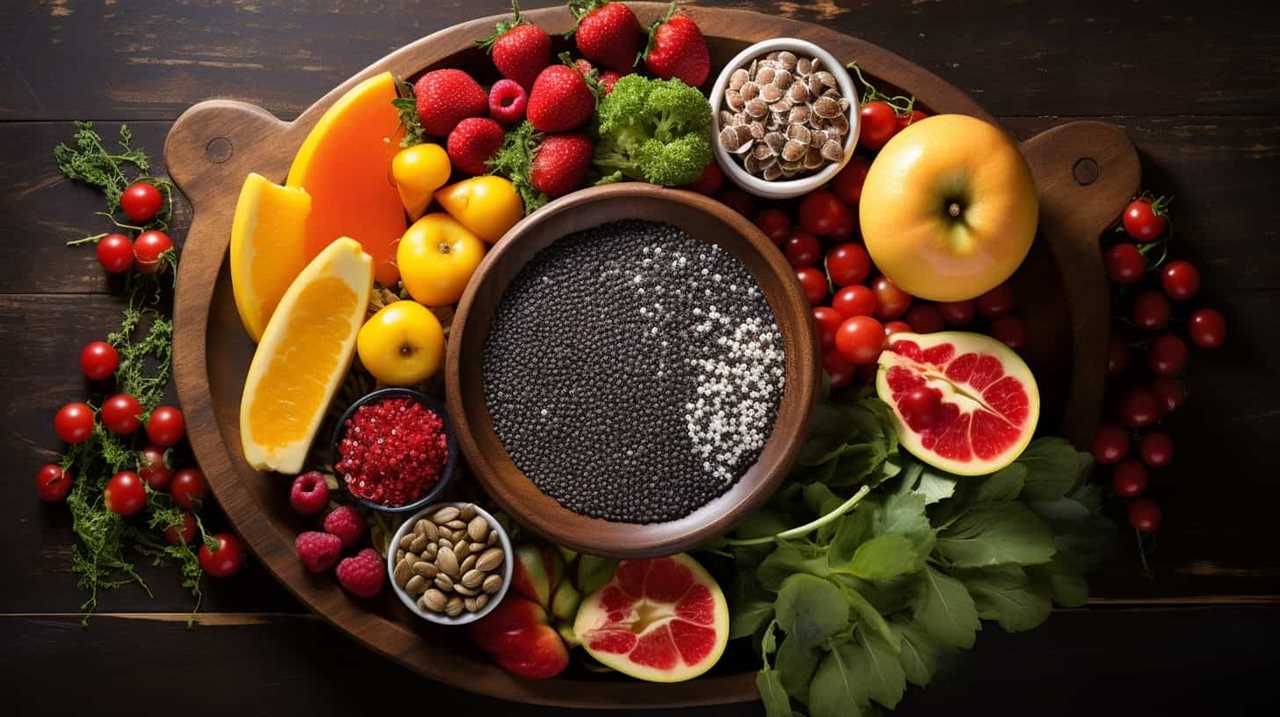
Preventing and Managing Chia Seed Allergies
To prevent and manage chia seed allergies, it is important to be vigilant about avoiding chia seeds and other foods that may cross-react with them. Chia seeds belong to the mint family, which means people with allergies to mint, oregano, thyme, or basil may also experience cross-reactivity with chia seeds. It is crucial to read food labels carefully and be aware of potential cross-contamination in processed foods. In addition, individuals with chia seed allergies should consider alternative sources of omega 3 fatty acids, such as flaxseeds, walnuts, or fish oil supplements. These alternatives can provide the necessary nutrients without triggering an allergic reaction. By staying informed, being cautious, and exploring alternative options, individuals can effectively prevent and manage chia seed allergies.
| Foods to Avoid | Alternative Sources of Omega 3 |
|---|---|
| Chia Seeds | Flaxseeds |
| Mint, Oregano, Thyme | Walnuts |
| Basil | Fish Oil Supplements |
Frequently Asked Questions
Are There Any Other Super Seeds That Have Similar Allergy Risks as Chia Seeds?
There are alternative super seeds that can have similar allergy risks as chia seeds. It’s important to be aware of the potential allergens in super seeds and consult with a healthcare professional if you have any concerns.
Can Chia Seed Allergies Develop Over Time, or Are Individuals Typically Born With This Allergy?
Chia seed allergies can develop over time, but individuals are typically born with a genetic predisposition for this allergy. Interestingly, studies show that only about 1% of the population is affected by chia seed allergies.
Are There Any Specific Age Groups That Are More Prone to Chia Seed Allergies?
Certain age groups may be more prone to chia seed allergies. However, it is essential to note that allergies can develop at any age. If you’re looking for an alternative, consult with a healthcare professional for personalized advice.

Can Chia Seed Allergies Cause Anaphylaxis, or Are They Usually Milder Allergic Reactions?
Chia seed allergies can cause anaphylaxis, a life-threatening reaction. In rare cases, severe reactions can lead to long-term effects. It’s important to be aware of the potential risks and take necessary precautions.
Are There Any Alternative Ways to Enjoy the Health Benefits of Chia Seeds for Individuals With Chia Seed Allergies?
There are alternative ways to enjoy the health benefits of chia seeds for those with allergies. Chia seed substitutes, such as flaxseeds or hemp seeds, can be used in recipes to provide similar nutritional benefits.
Conclusion
In conclusion, it’s crucial to be cautious of potential allergies when consuming super seeds like chia. The common allergic reactions and symptoms discussed highlight the importance of proper prevention and management.
By being informed and proactive, individuals can enjoy the numerous health benefits of these seeds without any unnecessary risks.
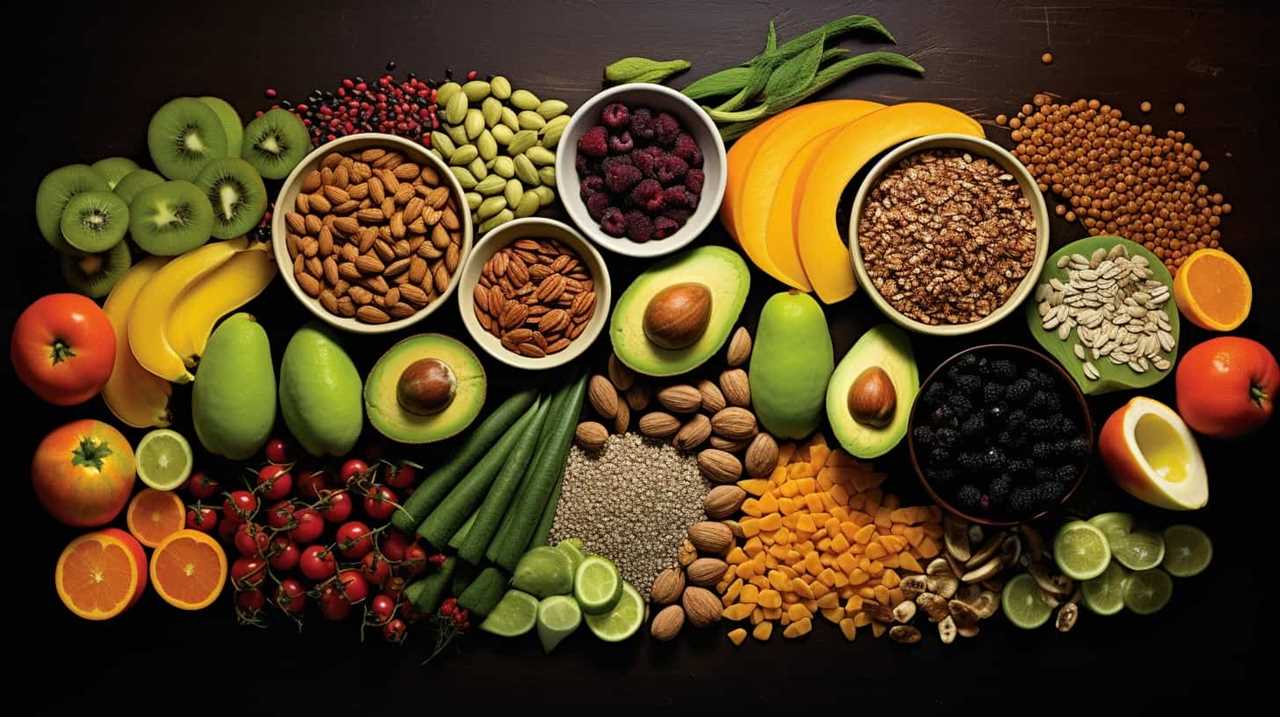
Stay safe, savvy, and seed-savvy!
Hi, I’m Sarah. I write for Turtle Tree Seeds, a news blog that loves food – all kinds of food. But especially bacon, chocolate, and veggies. We’re on a mission to show the world that you can enjoy all of those things, even kale and brussels sprouts. Because we believe that when it comes to food, there’s no such thing as guilty pleasures. Just pleasures.
I’m also a huge fan of puns (obviously).
-

 Chia Seeds3 months ago
Chia Seeds3 months agoCan Cats Have Chia Seeds?
-

 Chia Seeds3 months ago
Chia Seeds3 months agoDo Chia Seeds Make You Poop?
-

 Chia Seeds3 months ago
Chia Seeds3 months agoHow Do Chia Seeds Go Bad?
-

 Health Risks and Allergies Related to Chia Seeds6 months ago
Health Risks and Allergies Related to Chia Seeds6 months agoWhy Do Chia Seeds Gel
-

 Chia Seeds3 months ago
Chia Seeds3 months agoHow to Use Chia Seeds For Weight Loss
-

 Chia Seeds and Digestive Health3 months ago
Chia Seeds and Digestive Health3 months agoWhy Are Chia Seeds Beneficial For Gut Health?
-

 Beginners Guides3 months ago
Beginners Guides3 months agoWhat is Celery Juice Powder?
-

 Chia Seeds3 months ago
Chia Seeds3 months agoHealth Benefits of Chia Seeds For Dogs



















